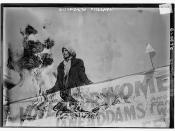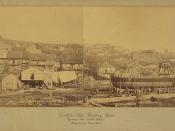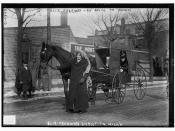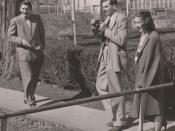Flannery O'Connor's "Good Country People" and the Symbolism Surrounding the Character's Names.
In "Good Country People" by Flannery O'Connor, uses symbolism in the choice of names, almost to the point of being ironic and humorous.
These names center around the personality and demeanor of the characters.
Hulga, once known as Joy, simply changed her name because it was the ugliest she could think of. Mrs. Freeman's name is ironic because she is burdened by the land that she works, so is not really free. Mrs. Hopewell's name is also ironic, because she trys to provide hope, but is in fact empty in her talk. Each one of these characters names, Hulga, Mrs. Freeman, and Mrs. Hopewell, show the symbolism used by Flannery O'Connor.
Hulga, the daughter to Mrs. Hopewell, was actually named Joy at birth. At the age of ten, Joy lost one of her legs in a hunting accident, and from that point on became a depressed realist.
At the age of twenty one, Joy moved out of the house, went to college, and legally changed her name to Hulga. Hulga most likely changes her name to spite her mother, because Joy is such a beautiful name and Hulga is such an ugly one. "She [Hulga] had arrived at it first purely on the basis of its ugly sound and then the full genius of its fitness had struck her...She saw it as the name of her highest creative act." Hulga alo changes her name because of the true way she feels inside. Hulga is the ugliest name she could think of and it shows her inability to love or become close to anyone. "One of her major triumphs was that her mother had not been able to turn her dust into Joy, but the greater one was that she had been able to turn it herself into Hulga." She does not think of herself as pretty, but in fact she believes that she is ugly and depressed and actually enjoys feeling this way.
Mrs. Freeman is the tenet farmer for Mrs. Hopewell. Mrs. Freeman is very nosy and has a fondness for the grotesque and secret infections. She has an attitude of trying to be someone she is not, almost as if she is trying to be like Mrs. Hopewell. When Mrs. Hopewell stated to Mrs. Freeman one of her many phrases "that life was like that, Mrs. Freeman would say, "I always said so myself." Nothing had been arrived at by anyone that had not first been arrived at by herself." Mrs. Freeman's name could mean two things. One possible meaning is that a freed slave was called a freeman, but Mrs. Freeman is a white tenet farmer, so technically she is not free. This could show how Mrs. Freeman would rather be a freed black slave, rather than a poor white farmer tied to the land. The other meaning is that when people first came to America, many people would become indentured servants, and then over time they would eventually get their freedom. These people were called freeman. This meaning could show how Mrs. Freeman had a desire to be free and not work for someone else. One day Mrs.
Hopewell had said to Mrs. Freeman, "You know, you're the wheel behind the wheel," and winked, Mrs. Freeman had said, "I know it. I've always been quick." This shows that perhaps Mrs. Freeman, although well knowing that she is basically a slave, had convinced herself that she is so much better and above that.
The last character, Mrs. Hopewell, is the mother to Hulga and the landowner to Mrs. Freeman. Mrs. Hopewell has certain sayings that she is constantly using, such as, "Everybody is different" and, "That's life." Although she may think that these saying provide hope, they actually are empty phrases and have no heartfelt meaning. This could be the symbolism behind Mrs. Hopewell's name, meaning she means to inspire hope, but her phrases are like a well, deep and empty.
Hulga, Mrs. Freeman, and Mrs. Hopewell all show how Flannery O'Connor used symbolism in choice selections for the names of her characters. These three main character's names allow the reader to see the irony in how the character's name fits with their actual behavior and deep dark thoughts.





![Suffragets [i.e., suffragettes] Freeman, Wentworth (LOC)](https://s.writework.com/uploads/7/71671/suffragets-e-suffragettes-freeman-wentworth-loc-thumb.jpg)